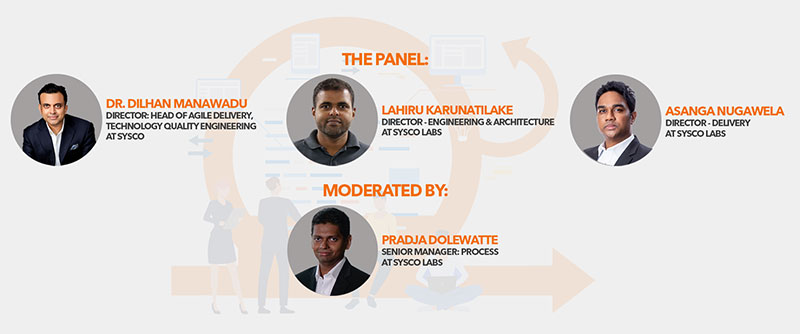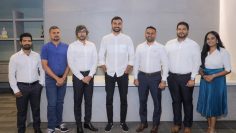
Sysco LABS Hosts Expert Panel on Pragmatic Agile
Pragmatic Agile: from Pitfalls to Pragmatism–a virtual panel discussion featuring experts from varied disciplines at Sysco LABS was held on 18th February 2021. The program was conceptualized in line with the Agile20 Reflect Festival – a global Agile festival featuring more than 600 events worldwide that took place in February 2021.
The panel discussion featured insights into the latest and most progressive developments in Agile. The three panelists, who possess over 60 years of combined experience, shared valuable insights pertaining to Software Delivery, Product Management, and Engineering and Architecture in an Agile and non-Agile context.
The speakers focused on the more practical elements of applying Agile in an organization and made the case for greater adoption of Agile in startups and enterprises. Dilhan Manawadu, Director and Head of Agile Delivery, Technology, Quality Engineering, and BT Studio at Sysco Corporation opined: “It is important for us to be more pragmatic towards applying Agile. To me, pragmatism is about returning to your basics, your fundamentals, understanding what they mean and getting them right. It is also important to be flexible and fluid when practicing Agile. It’s important to candidly give and receive feedback and thoughtfully incorporate that feedback and other learnings into your workflows moving forward. You can’t think Agile and implement Waterfall. It is also important to focus on the strengths of your people. Hire the right talent – a team who is motivated to get the job done. Thereafter, build team chemistry through collaboration activities like Sprint reviews and ceremonies. You can also use tools like gamification to further motivate teams.”

Speaking on applying Agile from an E Software Engineering perspective, Director – Engineering and Architectures, Lahiru Karunatilake said, “Getting your team structures, architecture, and design right is aligned with a pragmatic Agile approach. If you look at the Agile philosophy, what you will find is that the nature of the solution defines the team structure you need to create the solution. So, design your solution first and then rationalize your architecture. Based on this, you can structure your team accordingly.”
Director – Delivery Asanga Nugawela contributed to the conversation adding, “Don’t try to change and convert the entire organization over to Agile in one go. First, get departments like Engineering and Quality Engineering (who are more adaptive to Agile) to adopt these methods. Thereafter, you can move on to more traditional departments like Finance and HR. Also keep in mind that Agile is not a process. You need to be Agile in your attitude towards learning. As a leader, go beyond that scrum master role and be a coach where you continuously push your team to learn new things.”
The event was the brainchild of Senior Manager – Process, Pradja Dolewatte – a passionate Agile evangelist who truly believes in the potential the methodology has for transforming organizations. Reflecting on the success of the event and the vision behind the event he outlined, “The initial idea was to commemorate 20 years of Agile, and be part of a great line up of Sri Lankan events put together as a part of the Agile 20 Reflect Global festival. The festival challenged me to see where we will be with Agile 20 years down the line; whether the initial challenges that Agile hoped to resolve will be solved, or whether they will still exist. I was very happy with the response; and it seems people were passionate about this topic. What we really hoped to accomplish was to create awareness that Agile is about simple things and pragmatic thinking. As our speakers said, focus on the fundamentals; sometimes we need to take a step back to leap forward!”




